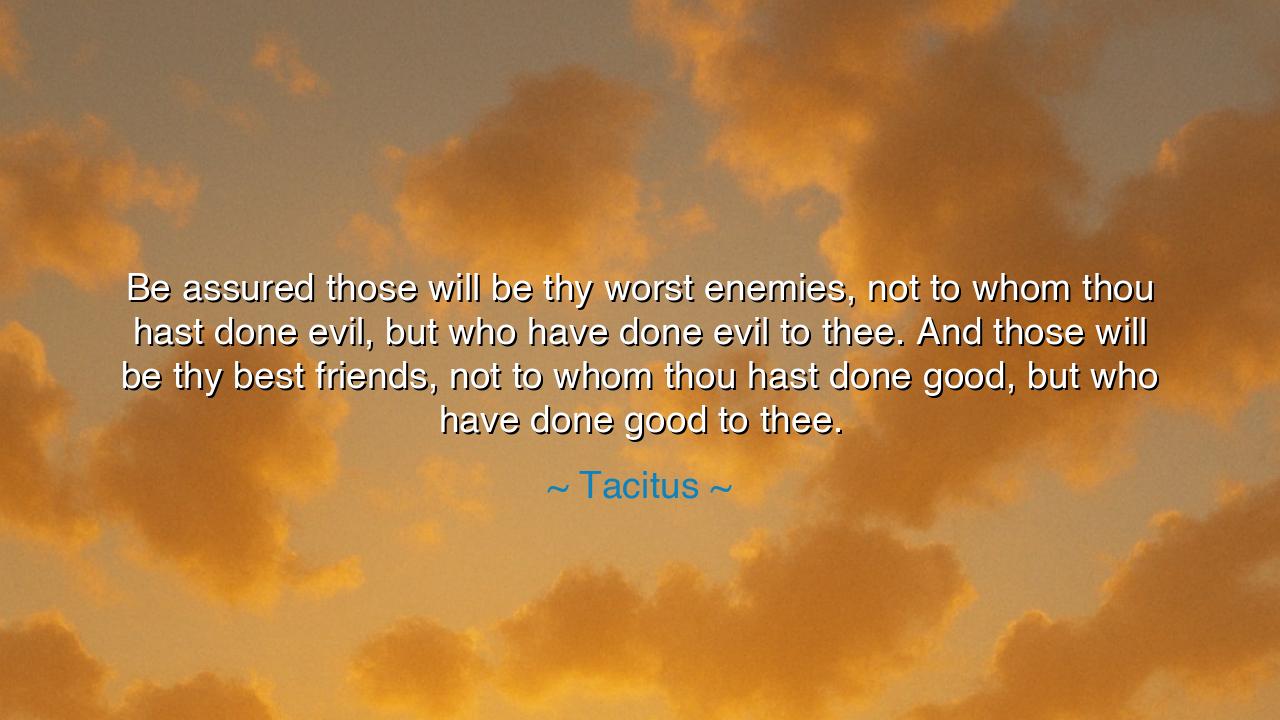
Be assured those will be thy worst enemies, not to whom thou hast
Be assured those will be thy worst enemies, not to whom thou hast done evil, but who have done evil to thee. And those will be thy best friends, not to whom thou hast done good, but who have done good to thee.






“Be assured those will be thy worst enemies, not to whom thou hast done evil, but who have done evil to thee. And those will be thy best friends, not to whom thou hast done good, but who have done good to thee.” — Tacitus
In this timeless observation, Tacitus, the Roman historian and philosopher, unveils one of the darker truths of the human soul — that gratitude and guilt, more than justice or mercy, often shape the bonds between men. When he declares that “those will be thy worst enemies, not to whom thou hast done evil, but who have done evil to thee,” he does not speak of law or vengeance, but of conscience. For the heart that has wronged another becomes its own tormentor; it seeks to justify its sin by hating the one it has harmed. Likewise, when he says, “those will be thy best friends, not to whom thou hast done good, but who have done good to thee,” he reveals that love is nourished not by pride in one’s own virtue, but by gratitude for the grace one has received. In this, Tacitus exposes the paradox of human nature: that we turn from those who remind us of our shame, and cling to those who awaken our sense of goodness.
Tacitus, who lived in the tumultuous age of emperors and intrigue, understood the workings of power and the frailty of men. He had seen loyalty crumble beneath fear, friendship twist under envy, and honor drown in self-interest. From his studies of emperors like Tiberius and Nero, he learned that those who commit evil often cannot endure the sight of their victims. The tyrant fears the gaze of the innocent, for it mirrors his corruption. And so, he seeks to destroy the reminder of his own guilt. Thus, the oppressor hates the oppressed, not because of what has been done to him, but because of what he himself has done.
History offers many echoes of this truth. Consider Brutus and Julius Caesar. Caesar loved Brutus as a son, yet Brutus struck him down. After the murder, it was not Caesar’s ghost that haunted Brutus — it was his own deed. He fled across the world, consumed by the guilt of what he had done. The memory of his betrayal turned inward, devouring his peace until he could bear it no more. Brutus became his own executioner, undone by the evil he had committed. Thus, as Tacitus foretold, the one who wrongs another becomes their own worst enemy, for no chain binds so tightly as guilt.
And in contrast, there is the healing power of gratitude — the light that binds hearts together when one receives good. The one who is helped, uplifted, or forgiven carries within them the seed of devotion. Think of Ruth and Naomi from the ancient scriptures: Naomi lost her husband and sons, and told her daughters-in-law to return home. Yet Ruth, who had received kindness from Naomi, refused to leave her. She said, “Where you go, I will go; your people shall be my people.” Ruth’s loyalty was not born from duty, but from gratitude — a love strengthened by the good she had received. So Tacitus speaks rightly: it is not the good we do for others that binds them to us, but the good they do for us that forges eternal friendship.
These words also reveal a warning to those who live in pride. Many seek power by giving favors, believing that generosity buys loyalty. But Tacitus reminds us that charity given for gain is but an illusion. He teaches that no man loves his benefactor simply because he has been helped — for help given with pride wounds as much as it blesses. But the one who has given good freely, and the one who has received it humbly, share a bond deeper than command or reward. The first is gratitude; the second, love born of grace.
The lesson is this: know the secret tides that move the hearts of men. If you would have peace, wrong no one — for every harm done will breed resentment, not from the victim, but from your own soul. And if you would have true friendship, learn to receive kindness as well as to give it. Be humble in gratitude, for it purifies the heart more deeply than prideful giving ever could. When someone does good to you, remember it with honor, and you will keep that bond sacred for life.
So remember, as Tacitus taught, that the heart is not ruled by reason but by conscience. Those who wound others will one day war against themselves, and those who cherish kindness will dwell in peace. Do not seek to conquer others with favors or force, but conquer yourself — for the noblest victory is mastery over pride. Then you will walk among both friend and foe with clarity, knowing that true strength lies not in power, but in the quiet radiance of gratitude and integrity.






AAdministratorAdministrator
Welcome, honored guests. Please leave a comment, we will respond soon